At the beginning of the press conference, President appreciated people’s massive attendance in 11 February demonstrations and stated that the Iranian people have displayed exceptional resistance since 2018, adding, "All indices show that the era of the United States’ maximum pressure has passed and sanctions will not have any fruits for the enemies and their calculations about Iran are wrong."
Referring to the bitter incidents in the past 1 year, President said, "The [Iranian] year we are approaching the end of was a year full of happenings for the great Iranian nation. In the beginning of this year, we faced unprecedented floods in 25 countries.”
“The martyrdom of General Soleimani, which was very hard for our people to take, and their attendance in his funeral proved that people will continue the path he chose,” he continued.
Referring to the Ukrainian plane crash and the death of a number of Iranians in Martyr Soleimani’s funeral, he said, "Our people have displayed exceptional resistance against foreign pressures since 2018.”
“Despite what the ill-wishers wanted, our problems this year are less than last year, and despite the fact that conditions are tougher than last year, all social, security and economic indices show that the United States’ maximum pressure is behind us,” said Rouhani.
The President continued, "There is no doubt that Americans have come to the conclusion today that the path and strategy they had chosen was based on a miscalculation and will not affect the great Iranian nation.”
He added, "Of course, sanctions will naturally create problems for the people and therefore it is possible that they can affect people’s lives, but these sanctions will be fruitless for our enemies.”
“They think that they can force us to the negotiation table by maximum pressure and what the US is seeking by maximum pressure and putting pressure on people is to force the government to the negotiation table but this is impossible,” said Rouhani.
He continued, "We will never go to the negotiation table with weakness, but we will explicitly and powerfully have our say before the world.”
“When you compare the figures with 5-6 or 8 years ago, we see that despite sanctions and pressures, this is the first time in the history of Iran that we are experiencing non-oil economy and we saw that the country is manageable without oil,” he added.
The President continued, "Of course, our progress may have been slower compared to the goals that the 11th and 12th governments had, but when we compare figures in water, energy, gas, power, agriculture, tourism, knowledge companies, industry and mines, services, health, and education, our conditions are relatively acceptable.”
He said, "My message in the short address in the beginning of the press conference is thanking the great people of Iran and stating that we will continue the path with the same power and we will eventually force the enemies to come to the negotiation table like before. In the 2015 negotiations, it was they who requested to negotiate.”
“Of course, today they are asking us for negotiation, but they must go back to the fair conditions to make it possible,” said Rouhani.
The President also went on to say, "Therefore, our path is the path of resistance and steadfastness and progress in the coming year.”
He added, "My message is a good next year, and I would like to thank the noble people of Iran for their resistance in tough times and enemy’s pressures.”
Answering a question regarding the Hormuz Peace Endeavour (HOPE) initiative, he said, "It is clear for the entire world that peace and stability in this region is impossible without a powerful and great country like Iran.”
“We have always sought security in this region and General Soleimani was one of the commanders who sought stability and security in the Persian Gulf and the Middle East,” he said.
Rouhani continued, "The HOPE initiative was announced at the UN General Assembly and proposed to the Secretary General, all countries and regional states, and I officially sent the initiative to all regional leaders and we called on all of them to participate in it.”
The President said, "Some regional countries welcomed it well and some others have not still given an explicit response to us, but we still believe that it is the regional states that must help establish peace.”
“We stress that all countries must enjoy security and stability in the region,” said Iranian President.
Answering a question about Trump’s impeachment and his pressures on Iran, he said, "It does not make any difference for us who rules America. What matters to us is our national interests. You know that in the US, there are two groups; a group believed that they could force Iran to take the path they want, and the other group believes that Iran is more powerful than this.”
“They thought that if they put maximum sanctions on Iran, we would not resist more than 3-4 months and we would surrender and force Iran to accept the offers they put on the table,” he said.
He continued, "Today after more than 20 months of maximum pressure, this policy has failed and we have better conditions in the region compared to two years ago and we are more united inside the country.”
Regarding messages that Saudi Arabia has sent to Iran, which the Saudi FM has denied, he said, "There have always been governments delivering messages to us. For this particular topic, first the Pakistani PM came and other countries as well, and recently, the Iraqi government has been active in this regard, as well as European governments”.
“We have always responded that we do not have a complicated unresolvable issue with Saudi Arabia and any time they are ready, we can discuss the issues. Of course, the most important issue in the region today is Yemen and it is very important for Saudi Arabia where it will end in,” he continued.
He said, "Saudi Arabia made a mistake towards Yemen in the region. They thought that they could make Yemen surrender within a few weeks or months. They have conducted an unprecedented killing there Of course, if Saudi Arabia stops its aggression towards Yemen, conditions will be readier for negotiation”.
“We believe that the Yemeni issues must be resolved by the Yemenis themselves and the countries that are carrying out acts of aggression towards the country must stop it,” said President Rouhani.
Answering a question about his opinion on regime change in the US and other presidential candidates, especially Sanders, he said, "What matters to us is that American officials and the White House change their minds. They must change their minds and choose what is in the interest of the American people and in the interests of the nations of the region; whatever party and individual it is. I do not care about a particular party or a particular person; what matters to us is that there is someone in the White House who makes the right calculations and chooses the path that benefits everyone”.
“America must abandon its unilateralism and forget that it is the leader of the world; neither America is the world leader nor unilateralism wins; If Americans abandon these two, those who rule the White House and choose unilateralism and do not consider themselves world’s leader and value all peoples and all legal governments equally, in my opinion, we can overcome these problems,” said Rouhani.
On the FATF deadline for approving the bills, the President said, "We hope that the next parliament works more closely with the government and, as the President, I am sorry that some of the several bills that we have forwarded to the Majlis were not reviewed there”.
“The government forwarded two very important bills to the parliament, which are Palermo and CTF. The government approved these and gave them to the parliament. The parliament treated them well and approved them,” he said.
He continued, "I am very sorry for what has happened today but I think it is out of the government's power. I met with the Supreme Leader in person several times and he explicitly said that he had no disagreement with the government bills”.
“But what decisions will the Financial Action Task Force make and what problems it will make, we don’t know. Anyway, we hope and do our best not to go back to the black list and if so, the government will continue working,” he said.
Regarding the trigger mechanism that the European signatories of the Joint Comprehensive Plan of Action (JCPOA) have activated, he said, "Nothing will happen in the next few weeks. The issue is that we have commitments under the JCPOA and that the other side has commitments. The other side could not live up to its commitments largely because of the United States’ withdrawal from the JCPOA and to a certain extent because of their inaction. We had to reduce our commitments in five phases as well”.
“In fact, today, we are not bound by our JCPOA commitments in our nuclear research and development or enrichment, and we are doing our job within the framework of the IAEA”.
He continued, "At first, the three European countries followed the Trigger mechanism, and then we argued that the procedure you chose is incorrect and does not apply to Article 36 of the JCPOA”.
“I explained in detail to Mr Borrell (EU foreign policy chief), who came to Tehran, and argued why in legal terms you cannot use Article 36 and I think that at least he did not object and said nothing and basically, accepted my argument,” he continued.
“I told him that Article 36 clearly states that "5+1" must do these things, so you must first take the United States back to the 5+1,” he said.
Rouhani added, "I told him you can't use Article 36 today and using Article 36 is not to anyone’s interest, neither to Europe, nor to us and anyone”
“Mr Borrell also told me that they had suspended the process for an indefinite period of time, that is, they suspended it for a long time, so that we would sit down later to see what we should do, so there is no trigger now and not in the coming weeks or even in the coming months. We will continue our nuclear activities under the supervision of the Agency”.
“We hope the Europeans can find a solution so that we can come to an understanding that they will return to their commitments under the JCPOA and that we will fully return to our commitments. In this regard, the Europeans have more or less promised us to work in this area, and we hope that this process will work”.
Regarding the Coronavirus in China and the outlook of economic relations, President Rouhani said, "We are very sorry that the dear Chinese people are dealing with this virus and the uninvited guest who put pressure on people in Wuhan and elsewhere”.
“But our relations with the Chinese government has always been good, and regarding the severe sanctions and pressure on the Iranian people, the Chinese government has maintained its friendship and friendly relations with us”.
He added, "China and Russia have had and maintained excellent relations with Iran, and we want to continue these friendly relations with China”.
Answering another question about the Sochi negotiations for resolving the Syrian crisis, he said, "The Sochi process is a very important political process and it has been successful since it started at the various levels of the negotiations in our region, even at the level of the three countries and will continue”.
“In my opinion, we should not abandon the Sochi agreement and process, and I very much want the Turkish government to respect the same agreements we had. Mr Erdoğan has clearly emphasised two points in all meetings: firstly, maintaining the integrity, solidarity and unity of Syria, and that the entire Syrian land must be under the control of the Syrian government, and secondly, the fight against terrorism, which we all agreed, should be continued”.
“Idlib is a Syrian province and we have to fight terrorism there. Turkey claiming that this war will lead to some people entering Turkey and seeking refuge is not a good reason”.
Rouhani added, "That is, a country cannot give up its sovereignty and territory and fighting for its own rights, because when it wants to fight the terrorists, some people may seek refuge”.
He continued, "Later, when security is established, everyone will return. Others should help Turkey in this regard”.
Regarding New York Times’ report that secret talks between the United Arab Emirates and Iran has happened, he said, "The amount we know is that the countries in the region, not only the UAE, but also a few other countries, warned the United States not to start a war in the region, and that could be naturally true”.
“We shouldn't be looking for its documents too much. War in the region is to the detriment of everyone; to the detriment of Iran, the Emirates, Bahrain, Qatar, Kuwait and all. No country will benefit from a war, and because they are on the southern edge of the Persian Gulf, if there is a war on the waterway, it will be dangerous for them and it is very natural that they are opposed to war”.
Rouhani added, "We also oppose war. I think Americans are not looking for war either. The signals we have so far received are because Americans know what it is bad for them. In particular, Mr Trump is seeking to succeed in the next election, so he plans on doing everything he knows to do and that a war will limit his chances”.
“But regarding whether or not we were -and are- negotiating with the United Arab Emirates, as far as my memory serves, it has never interrupted. We have always been in touch with the UAE at different levels, both at the level of services and at the level of political officials. We hope that such talks will result in stability and peace and good neighbourliness between Iran and its neighbours,” said the President.
MNA/President.ir


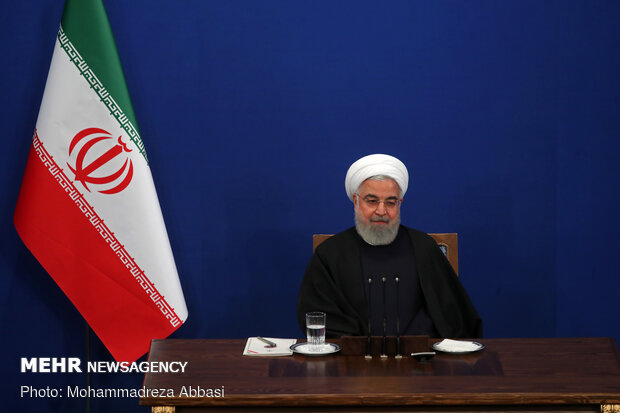


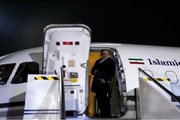

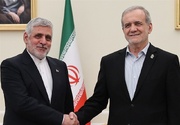
















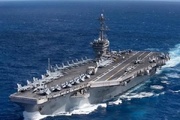
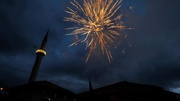
Your Comment